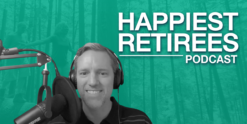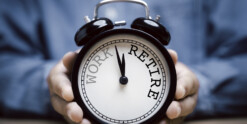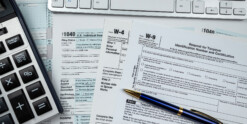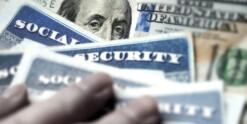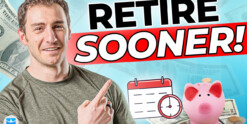My latest book, What the Happiest Retirees Know: 10 Habits for a Healthy, Secure, and Joyful Life was based on data and analysis from two new surveys encompassing nearly 2,000 American retirees. By charting their habits and then drilling down to the motivations behind them I was able to find educational and often eye-opening keys to a happy life in retirement.
To further illustrate the positive benefits of incorporating these traits I will point out the negative consequences of not doing so. You can find the first five in this week’s Atlanta Journal Constitution. Without further ado, here is a roadmap to living an unhealthy, insecure, and joyless life.
#6: Be disconnected
The happiest retirees on the block (HROBs) are social creatures. You aren’t. COVID quarantine gave you an excuse to lose touch with your neighbors rather than looking for creative ways to interact responsibly. You got married over Zoom but never sent out the link. Your mom still thinks you’re single.
On average, HROBs have more than 1.7 friends. You’ve got 1 acquaintance you text annually. The last concert you attended was Bob Dylan before he went electric. You pretended not to hear your wife when she hinted that TLC was performing at the Tabernacle on your anniversary.
Your brother saw you at the coffee shop but didn’t bother saying hello. “I guess I’ll just see him at Thanksgiving in 6 months,” he told himself.
You are well on your way to being fully disconnected from the world around you. Bravo!
#7: Be unhealthy
HROBs eat nutritious foods and stick to a health-conscious diet. They recognize the value of regular movement and exercise. Following that logic might lead you to realize there is no true wealth without some semblance of health. All the money in the world means nothing if you’re knocking on death’s door, but you need to mentally block that universal truth. Slamming fast food as you race from meeting to meeting is a great way to accelerate the seconds ticking off Father Time’s wristwatch.
Also very productive is to stare at the Surgeon General’s Warning about smoking cigarettes and still light one up like Joe Camel. As a bonus to these choices being disastrous to physical health, they also bleed over into emotional health, creating the perfect depression cocktail!
#8: Have terrible housing habits
A mortgage is a constant, mind-numbing refrain. It follows you around relentlessly—exactly the kind of subconscious stress you’re looking for.
If you can afford to pay off your mortgage, don’t do it. One irrefutable lesson I’ve learned from my research is that, regardless of interest rate and cost, getting rid of your mortgage by the time you retire is a powerful indicator of happiness. In other words, sidestep that opportunity by all means necessary.
HROBs live in nice houses but don’t overdo it. That’s why you need to march right out and purchase the biggest, tackiest, most overpriced McMansion you can find. Let’s put a real estate agent’s kid through college with that commission!
All that said, the second your child turns 18, you must downsize. My most recent study showed that HROBs don’t because they anticipate their kids and grandkids will visit. Make that less of an attractive option for them so you don’t have to stop playing online solitaire by yourself while your spouse watches a dreadful tv show in the other room.
#9: Exhibit erratic investor behavior
Since you skipped the TLC concert at the Tabernacle, you didn’t get to hear them sing their hit about the importance of not “chasing waterfalls.” It’s just as well because when it comes to the investment choice du jour, I want you to hunt like an alpha predator. Get in and out of the market early and often. Overdose on the adrenaline your body releases when the fight or flight caveman instincts take over. The data show us that remaining stoically invested over a long period almost always leads to substantial financial gain. Therefore, you must remain capricious and intemperate.
Remember that investment hardship is more about perfection and less about participation. If you hear the slightest rumor about a market decline, leave your money in cash and let inflation outpace its growth.
Losing money feels twice as bad as making money feels good and that’s why it’s so sweet. Unhappy retirees know how to miss the forest for the trees. Be reactive and let emotion dictate your decisions. Be a today investor.
#10: Never treat yourself to a latte
Have you ever been so intimidated by a strict diet that you quit and binged more than usual? That’s the way I want you to treat your finances. Prioritize saving over spending and then deprive yourself needlessly out of guilt, shame, and a misplaced sense of discipline. Note well the words of Suze Orman as she condemns every foam molecule that bubbles to the top of your frivolous latte.
Being penny-wise and pound-foolish is not only the perfect way to dump disastrous amounts of cash into endeavors that will take years for recovery but also an opportunity to enjoy exactly none of it.
Likewise, if travel is the one thing that makes you happy you should not do it. Wait until you’re too old and immobile to do the one thing that you love most. Think how proud your overbearing parents will be! After all, their PTSD from the Great Depression should be the north star of your entire life path.
If your spouse is more open and free about spending, make sure it becomes a constant source of conflict. If you’re lucky, you might even spend some of your retirement savings on marriage counseling.
Conclusion
By being masters of the middle, HROBs attain what they love and avoid what they don’t. They get delicious food without sacrificing health. They are careful with their money but spend on what brings them joy. They leave space for family and friends to join them on life’s journey. Don’t do any of this.
True unhappiness is not easy to achieve. But if you avoid moderation you truly can be unhealthy, insecure, and joyless.
This information is provided to you as a resource for informational purposes only and should not be viewed as investment advice or recommendations. Investing involves risk, including the possible loss of principal. There is no guarantee offered that investment return, yield, or performance will be achieved. There will be periods of performance fluctuations, including periods of negative returns. Past performance is not indicative of future results when considering any investment vehicle. This information is being presented without consideration of the investment objectives, risk tolerance, or financial circumstances of any specific investor and might not be suitable for all investors. This information is not intended to, and should not, form a primary basis for any investment decision that you may make. Always consult your own legal, tax, or investment advisor before making any investment/tax/estate/financial planning considerations or decisions.


